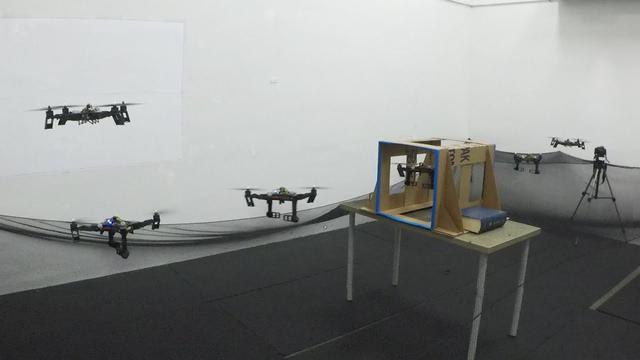
Quadcopters may be versatile drones, but those four spread-out arms do keep them from performing certain tasks. An experimental new drone addresses that shortcoming, with arms that passively fold down as needed.
First of all, we have previously seen quadcopters that can reconfigure themselves in mid-flight, although they've done so using electric actuators. This means that their shape-shifting capability consumes battery power, and adds electronic complexity.
Seeking a simpler alternative, scientists at UC Berkeley's High Performance Robotics Laboratory (HiPeRLab) have developed what they call the Midair Reconfigurable Quadcopter, which uses unactuated hinges. In simpler terms, this means that gravity or reverse thrust is all that's needed to cause each of its arms to flop down as needed.
This setup makes a number of maneuvers possible. For instance, if the horizontally travelling drone needs to squeeze through a narrow vertical opening, it reverses the direction of thrust on two opposing arms, causing them both to fold down. Because the thrust axes of those arms are offset from one another (the drone's body is rectangular, not square), the yaw torque produced by them counteracts the yaw torque produced by the other two arms.

As a result, the now-skinnier copter is able to smoothly and stably pass through the opening. Because the two folded-down arms are actually pushing in toward one another, they can also be used to grasp a flat-sided box by pinching it from either side. That box can then be lifted, flown through the air, and released at another location.
Additionally, if the hovering drone needs to drop down through a narrow horizontal opening, all four of its propellers reverse their direction of thrust, causing all four arms to fold down. As the copter proceeds to free-fall, its vertical orientation is controlled by varying the thrust of the props relative to one another. Once it has passed through the opening, the thrust is reversed back to its original state. This causes all of the arms to raise back up again, allowing the quadcopter to resume hovering before moving on.
Finally, if the drone needs to just sit and loiter on a power line for a while, it can do so by landing on that line and then shutting off all of its propellers. This causes all four of its arms to drop down, shifting the copter's center of mass below its point of contact, keeping it balanced on the power line.
Although the Midair Reconfigurable Quadcopter has recently gained publicity, it was first described in a 2019 paper published in the journal IEEE Xplore. The study was led by PhD student Nathan Bucki, Asst. Prof. Mark W. Mueller and researcher Jerry Tang.
You can see the drone in action, in the video below.
Source: HiPeRLab via IEEE Spectrum